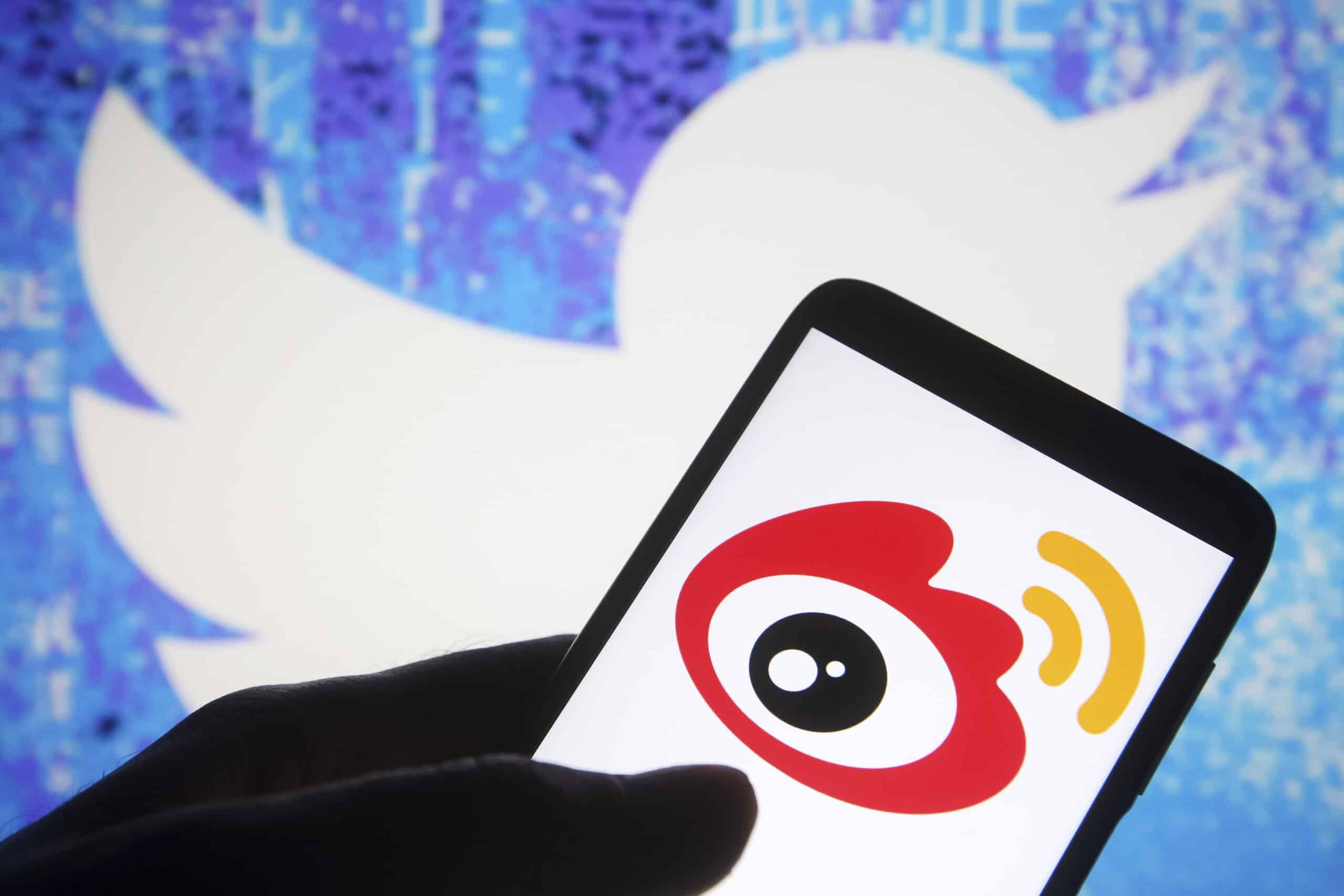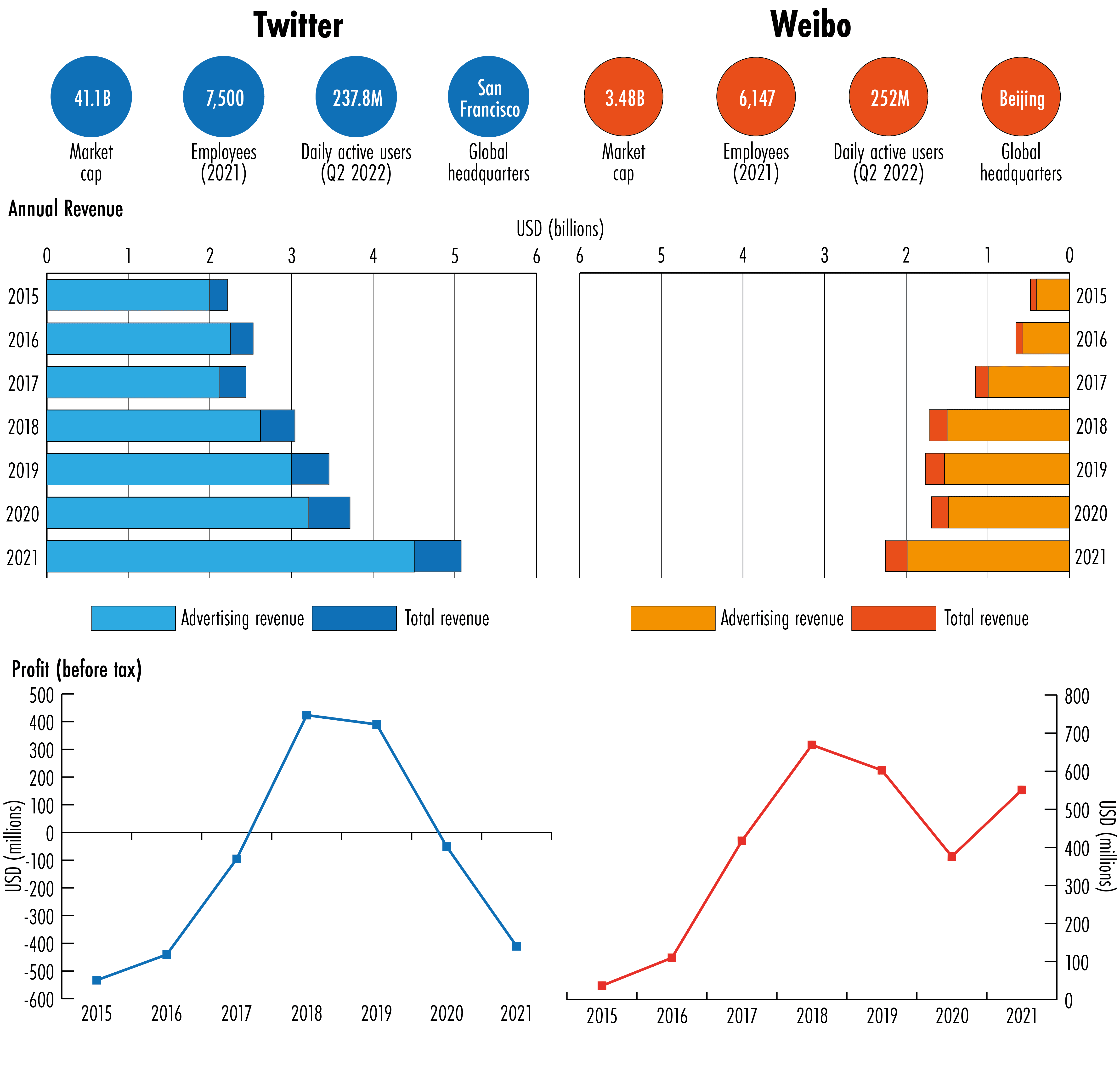
Twitter and Weibo: How do they match up? These are two of the most influential social media platforms in the U.S. and China, respectively. But their approaches to hotly contested questions concerning how social media is governed — from how to make money to account verification and content moderation — differ greatly.
A whirlwind of feature changes and policy flip-flops at Twitter have grabbed headlines in recent weeks. And as Twitter lurches from change to change under the mercurial leadership of its new owner, Elon Musk, the platform is becoming, in some ways, increasingly like its Chinese counterpart.
This week, The Wire compares Twitter and Weibo: their financials and business models, from premium services to content moderation.
FINANCIALS

Weibo is highly profitable; Twitter is not. The former, which is listed on the New York Stock Exchange, generated $550 million in pre-tax profit last year. Twitter, meanwhile, has reported losses in five out of the last seven years, including a $400 million dollar loss in 2021.1Twitter was delisted from the NYSE in November.
Advertising revenue accounts for the majority of the sales for each company, with Twitter bringing in more than double Weibo’s ad revenue in 2021. The two companies have comparable workforces of about 7,000 employees, but Twitter’s costs are higher. The median Twitter employee earned more than $230,000 in compensation last year. General and administrative costs, which include employee salaries, were equivalent to 15 percent of Twitter’s revenue in 2021, compared to 6 percent at Weibo.
A large share of Weibo’s advertising revenue comes from a single source. E-commerce giant Alibaba is Weibo’s largest customer and its second largest shareholder, with a 28 percent stake. Alibaba uses Weibo to advertise for its e-commerce platform. At its peak in 2014, Weibo drew more than 40 percent of its ad sales from Alibaba alone. Today, that proportion has shrunk to 9 percent, primarily due to significant growth in ad sales to other third parties.
PREMIUM SERVICES

While Twitter introduced its premium service, Twitter Blue, in June 2021, Weibo has offered a paid membership with perks since 2012, called the VIP program.
Twitter Blue has foundered since its inception — the company has not directly disclosed its revenue from Blue, but one estimate by Sensor Tower, a mobile analytics firm, puts it at about $7 million to date. By comparison, Weibo brought in $124 million in revenue from its VIP program in 2020 alone.
Weibo VIP membership perks include the ability to edit and gain preferential placement for one’s posts. A monthly subscription is priced at 10 RMB ($1.40), compared to $8 dollars for Twitter Blue in the U.S. (Musk has said the price of Twitter Blue will be adjusted by country proportional to purchasing power parity.)
ACCOUNT VERIFICATION
Just as verified Twitter users are referenced (or derided) as “blue checks,” verified Weibo users are referred to by some as “Big-Vs.”
After calling Twitter’s top-down verification program a “lords & peasants system,” Musk made blue check verification a perk under Twitter Blue, in effect allowing anybody to get ‘verified’ for $8 a month, with no ID check required. Blue checks took on competing functions as both a sign of official status and to show a user paid for Twitter Blue, a change which created a wave of account impersonators. A subsequent “official” label for institutions, celebrities and government officials was introduced, and then scrapped, and then re-introduced. On Friday, Twitter Blue’s rollout appeared to be suspended.
By adopting a multi-tier verification system, Twitter has taken a page out of Weibo’s playbook. Weibo’s users encounter a complex array of verification badges with varying levels of credibility. A yellow V, awarded to individuals for free provided they meet certain minimum criteria, offers little credibility these days — a thriving gray market for yellow V accounts makes it easy to obtain them cheaply.
Weibo’s other tiers include blue Vs for paying institutions, purple Vs for key opinion leaders, gold Vs for extra-important and paying key opinion leaders, all of which cost more than a VIP membership. This can make it difficult for casual users to distinguish between what is verified and credible versus what is simply paid for, raising questions about the wisdom of intertwining financial incentives with platform trust and safety.
CONTENT MODERATION
Beijing’s draconian requirements around the censorship of politically sensitive information on social media mean that Weibo and Twitter’s content moderation practices should not be directly compared. Nonetheless, there are similarities between the two.
Both companies outsource their content moderation to third party vendors. Most of Twitter’s work is done in the Philippines, according to a leaked report, where contractors have been criticized for providing insufficient mental health support to their workers. Meanwhile, Weibo outsources the censorship of videos to its own third party vendors, many of which are in Xi’an in the central China’s Shaanxi Province, according to Eric Liu, an analyst at China Digital Times, a website that monitors Chinese internet controls.
Liu, who previously worked for Weibo as a censor, explains that much of the content moderation there is done automatically by computers using artificial intelligence. “The technology to censor photos and text is relatively mature and highly effective,” he says, while video review demands more labor.
For Weibo, the conflicting interests of content moderation and premium users have posed challenges for the company, according to Liu. He says that prior to the company’s public listing in New York in 2014, censors were instructed not to ban the accounts of paying VIP members who violated content rules. Fearing reputational damage could derail the U.S. listing, managers instructed censors to only temporarily suspend VIP members who broke the rules. That preferential treatment ended after the successful listing, he says, but that the case is an example of premium users “buying off censorship.”
Weibo did not respond to a request for comment. Twitter no longer has a communications department.

Eliot Chen is a Toronto-based staff writer at The Wire. Previously, he was a researcher at the Center for Strategic and International Studies’ Human Rights Initiative and MacroPolo. @eliotcxchen



